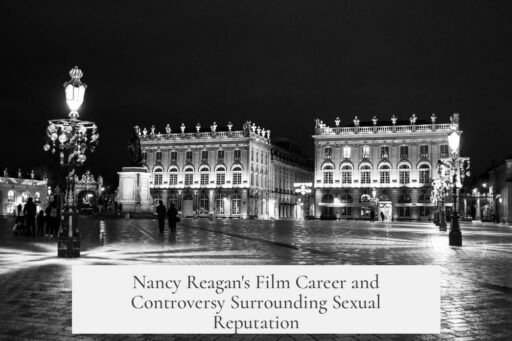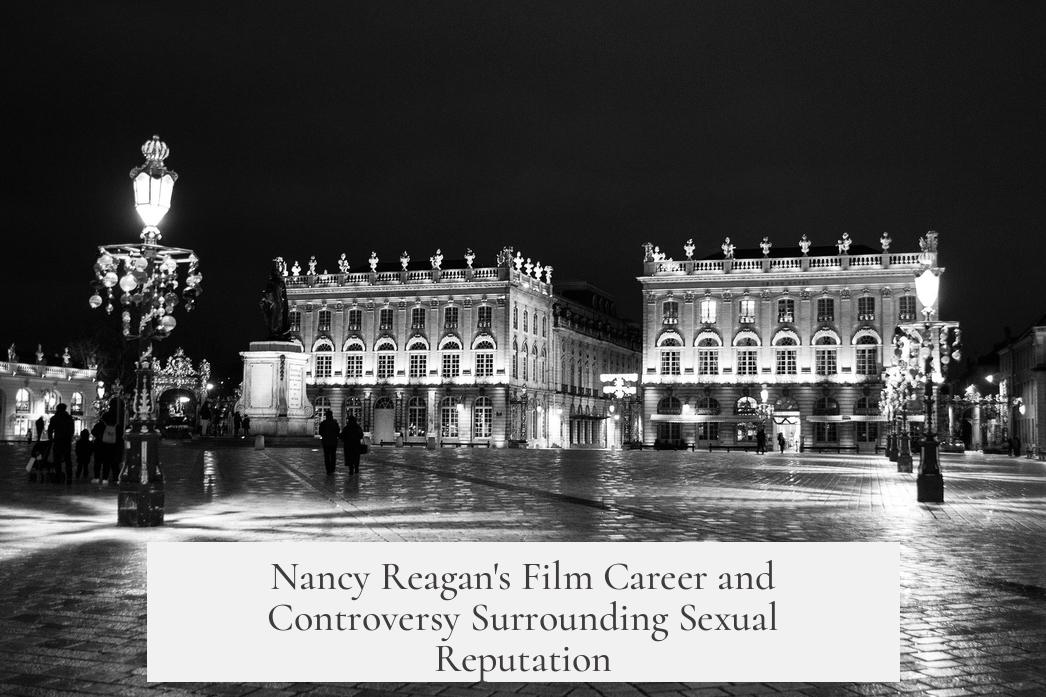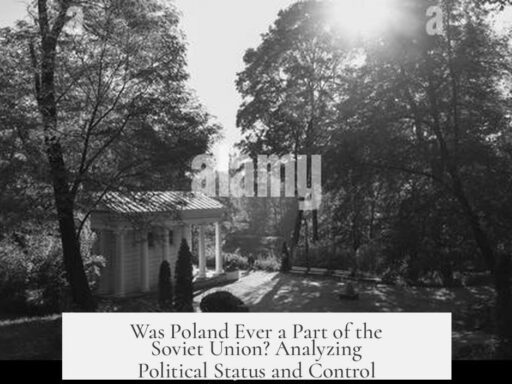There is no verified evidence that Nancy Reagan was known for performing oral sex during her days as a film actress. This claim originates primarily from Kitty Kelley’s 1991 unauthorized biography, which is controversial and includes many sensational, loosely sourced allegations. Direct confirmation or reliable contemporary accounts of this specific claim do not exist. Nancy Reagan’s personal memoirs and authorized biographies do not address such matters, making this topic one of speculation rather than documented fact.
The claim resurfaced recently on social media, triggered by a comparison between Nancy Reagan and Madonna’s expressions of sexuality at older ages. This led to citations of Kelley’s book referencing oral sex, which caught public attention anew. However, this book has long been a source of controversy and debate over its accuracy and methods.
Kitty Kelley is well-known for her investigative biographies of public figures. Historian Rick Perlstein praises Kelley’s work as well researched and extensive, standing out amidst many Reagan biographies that rely heavily on official memoirs. Perlstein notes that Kelley’s work challenges polite consensus, suggesting she digs deeper than authorized narratives. However, even supporters acknowledge that some of her claims may be based on rumor or anecdote rather than verifiable documents.
One piece of indirect evidence sometimes cited involves a telegram Nancy Reagan sent to Ronald Reagan, in which she used the phrase “missed his hot dog.” The telegram is preserved in the Reagan Library and is often interpreted as containing intimate, coded language with possible oral sexual connotations. Though open to interpretation, it is not sufficient proof of any well-known reputation or public knowledge about Nancy Reagan’s sexual activities, and pertains only to her private relationship with Ronald Reagan.
Kitty Kelley’s biography stirred major controversy upon its release. The Reagans themselves publicly denounced it as filled with falsehoods and lacking decency. Many reviews described the book as lurid and sensationalist, with some claiming it contains serious character attacks masked as journalism.
Maureen Dowd’s review encapsulates the mixed perception of Kelley’s work. Dowd recognizes Kelley’s skill in creating a complex image of Nancy Reagan, portraying her simultaneously as a manipulative political figure and a victim of her circumstances. However, Dowd critiques Kelley’s sensational style, noting the book’s “tawdry” and loosely sourced content. Despite that, Dowd finds Kelley’s biography compelling in capturing Nancy Reagan’s essence, despite methodological faults.
Several other sensational claims appear in Kelley’s book, illustrating a broader pattern of controversial allegations rather than isolated truths. These include speculative reports of an affair between Nancy Reagan and Frank Sinatra, and a deeply serious accusation of Ronald Reagan committing rape in 1951. The presence of such claims underscores the book’s penchant for provocative, often disputed content.
The difficulty in answering whether Nancy Reagan was “renown” for performing oral sex lies in the lack of reliable, corroborated sources and the private nature of such acts. “Renown” implies a public reputation or widely recognized fact, which does not exist in this context. Evidence remains anecdotal or metaphorical, often tied to private communications or secondhand reports, and never substantiated by independent witnesses or documents.
It is important to differentiate between public knowledge, rumor, and credible historical research. While Kelley’s research may provide insight into Nancy Reagan’s life beyond the official narrative, it must be approached cautiously. Many of her claims, including those about sexual behavior, remain unproven and controversial, relying on unnamed sources or indirect insinuations.
In summary, Nancy Reagan’s image as a Hollywood actress before becoming First Lady is well documented regarding her film roles and public persona. However, allegations of specific sexual behaviors during that time, notably performing oral sex, lack credible, verifiable support and reside in the realm of speculative and sensational biography rather than established fact.
- No verified or widely accepted evidence supports claims that Nancy Reagan was known for performing oral sex as an actress.
- Claims stem largely from Kitty Kelley’s controversial 1991 unauthorized biography featuring many sensational allegations.
- Reagan’s authorized memoirs and reliable biographies do not address or confirm such allegations.
- Historians praise Kelley’s research depth but acknowledge the sensational and sometimes loosely sourced nature of her work.
- Indirect evidence like coded telegrams offers suggestive but inconclusive insights into Nancy and Ronald Reagan’s private life.
- Kelley’s book includes numerous other controversial claims, highlighting its overall speculative character.
- The claim lacks public recognition and documented proof, thus Nancy Reagan was not “renown” for this behavior in any factual or historical sense.
Was Nancy Reagan publicly known for performing oral sex during her acting career?
No verified public records or memoirs confirm such claims. Nancy Reagan never discussed this, and authorized biographies do not include references to it.
Where did the claim about Nancy Reagan originate?
The claim first appeared in Kitty Kelley’s 1991 unauthorized biography. It resurfaced recently on social media but lacks direct evidence beyond Kelley’s account.
How credible is Kitty Kelley’s biography on Nancy Reagan?
Historian Rick Perlstein praises Kelley’s research as thorough, highlighting her book’s challenge to polished narratives. However, some critics find parts of it sensational and loosely sourced.
Is there any indirect evidence supporting the claim?
One example is a coded telegram Nancy sent to Ronald Reagan referencing a “hot dog,” which some interpret as suggestive. This, however, is metaphorical and not conclusive.
How did the Reagans respond to Kelley’s book?
The Reagans strongly denied the book’s allegations, calling many falsehoods flagrant and excessive. The biography sparked controversy for its lurid and sensational style.




